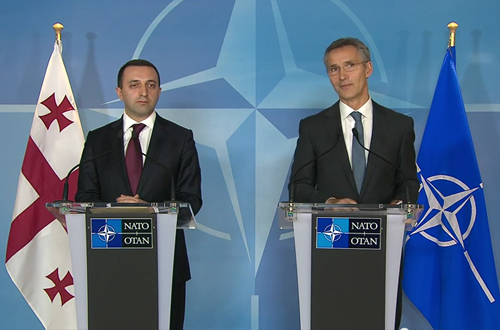| Georgian PM, NATO Chief Discuss Implementation of ‘Substantive Package’ |
| Civil Georgia, Tbilisi / 17 Nov.'14 / 21:24 |

Georgia’s PM Irakli Garibashvili (left) and NATO Secretary General Jens Stoltenberg (right) at a joint news conference after their meeting at the NATO headquarters in Brussels, November 17, 2014.
NATO Secretary General Jens Stoltenberg met Georgia’s PM Irakli Garibashvili in Brussels on November 17 and discussed implementation of the “substantive package” of cooperation, which NATO offered to Georgia at its summit in Wales in September.
Speaking at a news conference after the meeting, Stoltenberg said that the plan is to start implementing various elements of the package by the NATO defense ministerial meeting in February, 2015. He also said that more details would also be available by that time.
Among those elements of the package are assisting defense capacity building in Georgia through, as Stoltenberg put it, “embedded trainers” and setting up of a joint training center in Georgia.
“Today we discussed how to translate these initiatives into actions,” Stoltenberg said.
“We are pleased that Georgia will also host NATO-Georgia Training Center. The Center will help the Georgian forces to maintain their ability to work with NATO and it will prepare Georgia and other partners for future contributions to NATO Response Force,” the NATO Secretary General said.
Asked about Russia’s concerns over planned NATO-Georgia Training Center, the NATO Secretary General responded: “We have decided to establish the training center, it’s going to be established, because Georgia is a sovereign nation and NATO is an organization that works together with a strong and committed partner, Georgia.”
“We are going to continue to impalement the package we agreed in Wales,” Stoltenberg.
PM Garibashvili said that the Georgian government is “committed to timely and effectively implement the substantial NATO-Georgia package.”
At the press conference, Georgian journalists asked twice the NATO Secretary General if he had any “concerns” or “doubts” about Georgia’s commitment to NATO integration. The question stems from a recent cabinet reshuffle, which involved firing of defense minister Irakli Alasania and resignations of foreign minister and state minister for European and Euro-Atlantic integration.
“The Prime Minister was very strong, very clear” about Georgia’s NATO integration commitment, Jens Stoltenberg responded and added that he has “no reason to doubt” about it.
“I want to underline that the Prime Minister strongly underlined in talks that we had that Georgia is continuing on its path towards more Euro-Atlantic integration and I very much welcome this commitment; it is a strong commitment and it is an important commitment,” the NATO Secretary General said.
Thanks for the meeting @PrimeMinisterGE and the new Georgian team that is staying the course towards Euro-Atlantic integration.
— Jens Stoltenberg (@jensstoltenberg) November 17, 2014Earlier on November 17, Georgia’s new Defense Minister Mindia Janelidze, who has replaced on this post Irakli Alasania, met in Brussels NATO Secretary General’s Special Representative for the Caucasus and Central Asia, James Appathurai. The latter wrote on his Facebook after the meeting that Georgia’s new Defense Minister “has a clear idea of his Ministry’s priorities”, is focused on the implementation of the substantial package to help speed up Euro-Atlantic integration, and “understands both the strategy and the detail of his portfolio.” “Overall, from my point of view, an encouraging start,” Appathurai wrote.
PM Garibashvili reiterated after the meeting with the NATO Secretary General that the Euro-Atlantic integration is the choice of the Georgian people and “on our part we will spare no effort to achieve this goal.”
NATO Secretary General Stoltenberg praised Georgia’s “impressive progress in recent years” and said that Georgia is one of NATO’s “most committed partners”, which plays “an outstanding role in our operations.”
“And we commend you for that,” he said at the joint news conference with the Georgian PM.
“And we will support you as you continue to take forward the democratic reforms in your country. That includes further strengthening the rule of law, including the independence of the judiciary,” Stoltenberg said, adding that Georgia “has moved closer to NATO in recent years.”
PM Garibashvili said that at the meeting he noted with “deep concern” Russia’s intention to sign the new treaty with Georgia’s “occupied territory” of Abkhazia. Tbilisi has condemned the intention as an “attempt to annex” the breakaway region.
Garibashvili expressed “regret” that “the Russian side did not respond to our constructive policy in the same spirit and they continue destructive policy towards Georgia’s occupied regions – de facto annexation of Abkhazia and possibly Tskhinvali region as well.”
“We remain confident that the issue of Georgia’s occupied territories will remain on the screen of radar of the Alliance,” PM Garibashvili said.
Garibashvili also noted developments in Ukraine and said: “What we are facing right now in Ukraine is a continuation of our war in 2008” – he was referring to the August, 2008 between Georgia and Russia.
“But we keep moving, we are on the right track and we will continue,” the Georgian PM said.
